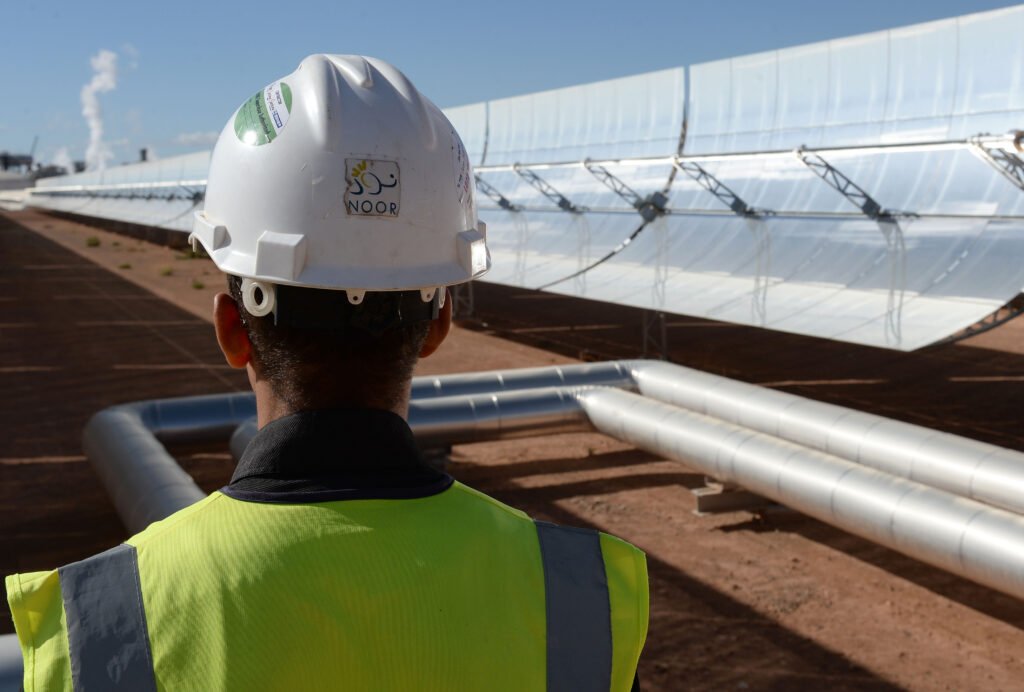
Imagine waking up to a sunrise over the Atlas Mountains, the golden rays illuminating sprawling solar farms and wind turbines stretching across the horizon. Morocco, a country historically known for its vibrant culture and rich history, is rapidly transforming into a shining example of renewable energy innovation. This shift isn’t just about harnessing natural resources; it’s about creating a robust economic engine that offers new opportunities for its people, drives sustainable development, and positions Morocco as a leader in the global renewable energy landscape.
In this comprehensive exploration, we’ll delve into how renewable energy jobs are shaping Morocco’s economy, the factors fueling this transformation, the types of careers emerging, and what this means for the future of Morocco and beyond. Whether you’re an aspiring professional, investor, policymaker, or simply curious about the green revolution, this guide will equip you with valuable insights into one of Africa’s most ambitious energy transitions.
The Moroccan Renewable Energy Revolution: A Brief Background
Morocco’s commitment to renewable energy is rooted in its ambitious goal to generate over 52% of its electricity from renewable sources by 2030, primarily through solar, wind, and hydropower projects. This vision is part of the national strategy outlined by the Moroccan Agency for Sustainable Energy (MASEN), which aims to reduce reliance on imported fossil fuels, cut greenhouse gas emissions, and foster economic growth.
The country’s geographic position offers immense potential. The Sahara Desert provides abundant sunlight ideal for solar farms, while the Atlantic coast offers steady wind patterns perfect for wind turbines. Additionally, Morocco’s existing hydropower infrastructure complements these efforts, making it a diversified renewable portfolio.
Projects like the Ouarzazate Solar Power Station — dubbed the world’s largest concentrated solar power plant — have positioned Morocco as a pioneer in renewable energy in Africa. This ambitious infrastructure development has catalyzed a new wave of employment opportunities across various sectors, from construction and engineering to research and community engagement.
How Renewable Energy Jobs Are Reshaping Morocco’s Economy
The transition to renewable energy isn’t just about clean power; it’s a catalyst for economic diversification and job creation. Here’s how:
1. Job Creation Across the Supply Chain
From manufacturing solar panels and wind turbines to installing and maintaining these systems, the renewable energy sector creates a broad spectrum of employment opportunities. According to the International Renewable Energy Agency (IRENA), renewable energy sectors tend to generate more jobs per unit of electricity produced than fossil fuels, highlighting their potential as employment engines.
Morocco’s local industries are beginning to benefit as well, with increased demand for specialized components and services. For example, local companies are now involved in producing parts for solar panels and wind turbines, fostering a nascent manufacturing ecosystem.
2. Skills Development and Capacity Building
The renewable energy boom demands a skilled workforce, prompting investments in training and education. Moroccan universities and technical institutes are partnering with international organizations to develop specialized curricula, workshops, and certification programs.
These initiatives not only equip Moroccans with the skills needed for green jobs but also promote knowledge transfer from global leaders in renewable technology. This capacity building is essential for ensuring sustainability and local ownership of renewable projects.
3. Rural Development and Local Empowerment
Many renewable projects are situated in rural and remote areas, offering opportunities for local employment and economic upliftment. For example, solar mini-grids in off-grid villages improve energy access while providing jobs in installation, operation, and maintenance.
This decentralization of energy production can spur small business development, improve livelihoods, and reduce urban migration pressures, fostering inclusive growth.
4. Attracting Foreign Investment and Promoting Export Opportunities
Morocco’s renewable energy sector has attracted significant foreign direct investment (FDI) from countries like France, Spain, and China. These investments often come with technology transfer and employment commitments, fueling local job markets.
Moreover, as Morocco advances its renewable capabilities, it has the potential to become an exporter of solar and wind technology, creating new export-oriented job opportunities.
Types of Renewable Energy Jobs Emerging in Morocco
The renewable energy sector is diverse, offering roles that suit a range of skills and educational backgrounds. Here’s a closer look:
Design and Engineering
From designing solar farms and wind parks to developing grid integration solutions, engineers and technical designers are crucial. These roles require expertise in electrical, mechanical, and civil engineering, often supported by specialized training programs.
Construction and Installation
Building large-scale projects involves construction workers, electricians, crane operators, and project managers. These jobs are often temporary but stimulate local economies during peak development phases.
Operations and Maintenance
Once projects are operational, ongoing maintenance ensures efficiency and longevity. Technicians, monitoring specialists, and safety personnel keep the systems running smoothly, securing long-term employment.
Research and Development
Morocco’s commitment to innovation has spurred research roles aimed at improving renewable technologies, optimizing energy storage, and integrating smart grid solutions. Universities and research centers play a critical part in this ecosystem.
Policy and Community Engagement
Effective energy transition requires policy analysts, environmental consultants, and community outreach specialists to foster acceptance, ensure environmental compliance, and develop sustainable models.
Manufacturing and Supply Chain
Local manufacturing of renewable components—such as solar panels, inverters, and wind turbine blades—creates jobs in production, quality control, and logistics.
The Challenges and Opportunities in the Moroccan Green Job Market
While the prospects are promising, several challenges must be addressed to maximize employment benefits.
Challenges include:
- Skills Gap: There’s a need for widespread technical training to prepare workers for specialized roles.
- Local Content Development: Ensuring local industries benefit from renewable projects requires strategic policies and incentives.
- Financial Barriers: Securing funding for large-scale projects and ensuring affordability can influence job creation.
- Environmental and Social Considerations: Projects must balance ecological preservation with economic development, ensuring community wellbeing.
Opportunities involve:
- Public-Private Partnerships: Collaborations can accelerate project deployment and skill development.
- Regional Integration: Morocco’s renewable initiatives can serve as a model for neighboring countries, expanding regional job markets.
- Innovation and Entrepreneurship: Startups and local entrepreneurs can develop niche solutions, such as solar-powered devices or maintenance services, creating more jobs.
Comparing Renewable Energy Job Opportunities: Morocco and Global Context
| Aspect | Morocco | Global Average | Remarks |
|---|---|---|---|
| Job Density (jobs per MW) | Higher than fossil fuel sectors | Lower in fossil fuel sectors | Renewable jobs tend to be more labor-intensive |
| Types of Jobs | Wide range including manufacturing, installation, R&D | Similar globally | Local content policies can influence job diversity |
| Growth Rate | Rapid growth due to ambitious targets | Steady but slower in developed countries | Policy driven and project pipeline crucial |
| Skills Required | Increasing need for technical and managerial skills | Varies, with a trend toward specialized skills | Training programs are vital for workforce readiness |
FAQs About Renewable Energy Jobs in Morocco
Q1: Are renewable energy jobs in Morocco accessible to local workers?
Absolutely. Although some specialized roles require advanced technical skills, many jobs—especially construction, installation, and maintenance—are accessible to local workers, especially with targeted training programs.
Q2: What skills are most in demand?
Electrical, mechanical, civil engineering, project management, and environmental assessment skills are highly sought after. Additionally, emerging areas like data analysis and smart grid technology are gaining importance.
Q3: How can I pursue a career in Morocco’s renewable energy sector?
Start by gaining relevant education in engineering or environmental sciences. Seek internship opportunities or training programs offered by Moroccan universities, technical institutes, or international organizations involved in renewable projects.
Q4: Are there opportunities for entrepreneurs and small businesses?
Yes. The sector offers opportunities for startups in manufacturing, maintenance services, consulting, and innovative solutions tailored to local needs, especially in off-grid and rural contexts.
Q5: What policies support renewable energy employment?
Morocco’s government, through MASEN and other agencies, offers incentives, subsidies, and partnerships to foster local industry development and job creation. Keeping abreast of policy updates is crucial for stakeholders.
The Future of Renewable Energy Jobs in Morocco: What Comes Next?
Morocco’s renewable energy journey is just beginning. As projects expand and new technologies emerge, the demand for a skilled, innovative, and adaptable workforce will grow exponentially. The country’s focus on education, capacity building, and local industry development positions it well to capitalize on this momentum.
Furthermore, Morocco’s strategic geographic location and commitment to regional energy cooperation open doors for export opportunities and regional job markets, amplifying the economic benefits.
For individuals, businesses, and policymakers, this presents a compelling landscape of opportunity. Embracing continuous learning, fostering innovation, and nurturing local industries will be key to unlocking the full potential of renewable energy in Morocco.
A Final Reflection: Building a Sustainable, Prosperous Future
Morocco’s bold renewable energy ambitions serve as a beacon for sustainable development in Africa and beyond. The burgeoning green jobs sector not only contributes to climate goals but also transforms lives, communities, and the economy. It’s a story of resilience, innovation, and hope—a testament to how harnessing natural resources responsibly can pave the way toward a more sustainable and equitable future.
If you’re inspired to be part of this green revolution, now is the time to explore opportunities, acquire skills, and contribute to Morocco’s bright energy future. Together, we can turn the sun and wind into engines of prosperity, fostering a cleaner planet and a thriving economy for generations to come.
Next Steps
- Explore educational programs focusing on renewable energy and sustainable development.
- Connect with organizations like MASEN or Moroccan universities for training opportunities.
- Stay informed about new projects and policies shaping Morocco’s energy landscape.
- Consider investing or starting a business that aligns with renewable energy growth.
- Advocate for policies and initiatives that promote local employment and sustainable practices.
Remember: The transition to renewable energy isn’t just an environmental imperative; it’s an economic opportunity that can redefine Morocco’s future. Embrace the possibilities, and be part of this exciting journey toward a greener, more prosperous Morocco.
